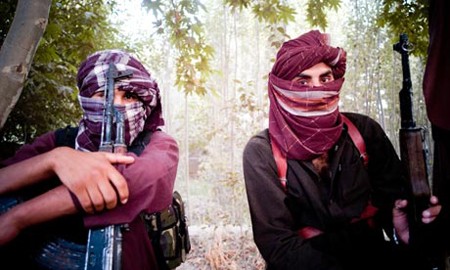By Jon Boone

Taliban fighters in a Madrassa compound near the northern city of Kundoz in Afghanistan.
Taliban fighters who have maimed and murdered but who lay down their weapons will be given immunity from prosecution according to a law that came into force without announcement in the weeks running up to last month's London conference on Afghanistan.
The sudden implementation of the controversial law, which had been shelved for almost two years since it was passed by a slim parliamentary majority in 2007, has raised fears that the Afghan government is ignoring the rights of Taliban victims for the sake of President Hamid Karzai's push for a quick peace deal with insurgents.
The reconciliation and general amnesty law also gives immunity from prosecution to all of the country's warlords, the former factional leaders, many of whom are hated for the atrocities they committed during Afghanistan's civil war in the 1990s.
In Kabul tomorrow the 1992 massacre of hundreds of mainly Hazara civilians in the Afshar district of the city will be commemorated at one of the capital's mosques. At the same time protesters are due to demonstrate in western Kabul against the amnesty law.
Brad Adams, the Asia director of Human Rights Watch, said the law was a "total abdication of the state's responsibility to investigate and prosecute crimes".
He said: "Karzai has been vigorous in calling for justice and investigation after civilian casualty incidents in the current conflict, and victims of past conflict deserve the same protection."
Adams added that although the law only protects offenders from prosecution by the state, it is unlikely that individuals would pursue private cases "in the current context of impunity and the very real fears of reprisal".
In Afghanistan laws do not come into effect until they have been "gazetted", which involves the publication of hard copies and their distribution to judges as well as an electronic version being put on the ministry of justice's website.
But this did not happen after the law was passed for a second time by parliament in March 2007 after it aroused opposition among the public who thought it was an act of self-interest by warlord MPs.
Last year the Afghan government told the UN human rights council that Karzai had never signed the law. That effectively left it in limbo, although the constitution says legislation must become law 15 days after it is passed by parliament, regardless of the president's actions.
It is still not clear exactly when the law was published, but one researcher discovered an electronic copy in late December.
Nader Nadery, of the Afghanistan independent human rights commission, said many people were deeply suspicious of its sudden appearance as an official law after such a long hiatus. "Why this long delay and what was this purpose? When we followed it up we found that someone in the president's office sent the law, after two years, to the ministry of justice and asked that it should be gazetted," he said.
Tonight a ministry of justice spokesman denied that claim.
But Nadery echoed the view of many human rights workers and western diplomats who fear that the late gazetting of the law was to "give an incentive to the Taliban to reconcile" in the runup to the London conference.
He said the law could also "encourage people to act with impunity" and made the government look weak, potentially encouraging more people to join the Taliban.
With the security situation in Afghanistan continuing to deteriorate and weakening public support in Nato countries for the military mission there, attempts to persuade insurgents to lay down arms and enter peace negotiations are being enthusiastically pushed by the Afghan government and its international allies.
Shortly before the London conference the UN removed the names of five former members of the Taliban regime from its international "blacklist", in an attempt to boost the reconciliation agenda.
Waheed Omar, a spokesman for Karzai, said there was "no link" between the gazetting of the law and reconciliation. Although he said the law had been enacted "long before" the peace plan was formed, he did know when it had been enforced.
"For us the first priority is to end the suffering of people and we are pursuing the peace plan for that specific objective," he said.



